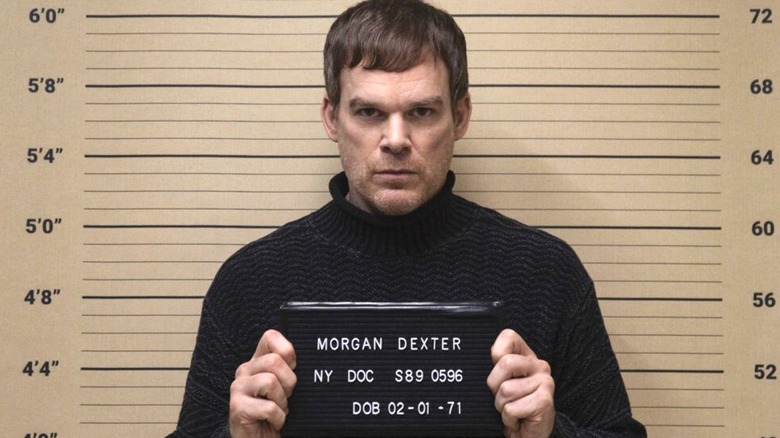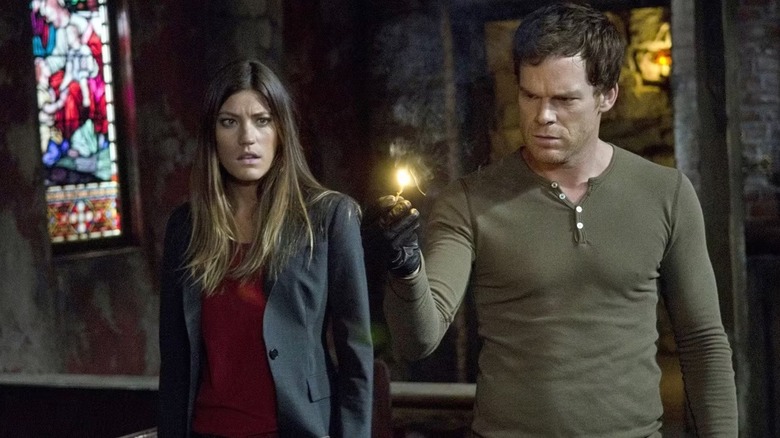How Many People Has Dexter Morgan Killed?
This post contains spoilers for "Dexter" and "Dexter: New Blood."
"Tonight's the night. And it's gonna happen again and again. Has to happen." These opening lines grace the pilot episode of "Dexter," in which blood splatter specialist Dexter Morgan (Michael C. Hall) drives around while being on the prowl. What sets this show apart from most police procedurals is its upfront positioning of Dexter as a morally complex figure, a killer who (mostly) murders other killers who have managed to escape the justice system. However, this moral positioning starts to unravel once his meticulous plans start spiraling out of control and jeopardizing the faux-identity he has painstakingly crafted over the years. This tension between our intimate knowledge of Dexter's skewed vigilantism and the escalating suspicion about his crimes grants "Dexter" the edge required to become the tense, thrilling character-focused procedural that it is.
That said, even the best shows lose their way, and "Dexter" does fumble and make some questionable storytelling choices in its final seasons. To remedy that, "Dexter: New Blood" was served up as a treat to longtime fans, where the story picks up 10 years after the original series finale, in which Dexter (apparently) faked his death. "New Blood" posits a fresh start for Dexter, who seems to have suppressed his killer instincts in favor of a mundane existence far removed from crime scenes. However, the "Dark Passenger" (the conceptual personification of his trauma) inside him is bound to awaken once he's forced to confront the past, and "New Blood" proves that old habits and impulses die hard.
This shouldn't come as a surprise, but Dexter has killed people. A lot of people. He's a serial killer with an elaborate modus operandi designed to evade detection, and even some of his more spontaneous kills inform an established worldview. How many people has Dexter killed? The answer is a whopping 149.
Why Dexter Morgan feels the need to enact his own justice
Personal definitions of justice can quickly become a slippery slope once intentions and egos are left unchecked. It is not outlandish to compare Dexter's (self-perceived) moral superiority to that of Light Yagami from "Death Note," who sincerely starts out believing that killing criminals who evade the system is morally justified. Light's criteria for using the Death Note might be more arbitrary and egotistic than Dexter's trauma-fueled quest to become a serial killer vigilante, but the two suffer from the same twisted, inflated morality that conveniently bypasses self-scrutiny. While Light's intentions get warped into megalomania and an obsession with playing god, Dexter's interpretation of Harry's Code becomes increasingly out of control once his moral compass (or lack thereof) is challenged.
Not every person among the 149 people Dexter has killed has been a part of his Kill Ritual, in which he re-imagines the murders as an offering to the innocent victims, whose memories and personal belongings are transformed into objects of reverence. There are kills outside of Harry's Code, where he has targeted people who haven't killed anyone before, such as murdering Oscar Prado in self-defense and performing a mercy kill on Camilla Figg. There have been times when Dexter has mistakenly killed an innocent, such as Jonathan Farrow, whose assistant, Timothy, turned out to be the real killer.
Dexter's need to kill is an impulse caused by childhood trauma, and the Code is a way to streamline these desires with the least amount of casualties. However, it is impossible to extract personal justice from personal revenge, as the two often go in hand: this led to some personally motivated kills throughout the series. Examples include his brother, Brian Moser, who murdered sex workers for years, and Arthur Mitchell/The Trinity Killer, whose methods he had admired for years.
At the end of "Dexter: New Blood," Dexter realizes that his Code is flawed and that a vigilante killer should be judged by the same standards that apply to the murderers he has killed. In case you want more of Dexter, be sure to check out the prequel series "Dexter: Original Sin," which premiered on December 13, 2024, on Paramount+ with Showtime.

